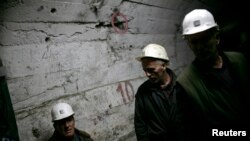Hundreds of miners in Kosovo refused to resurface at the end of their shift on Tuesday to protest a government policy reversal on the fate of the mine, which is claimed by the country's former master Serbia.
Fearing bankruptcy, Kosovo's new government said last week it would take control of the sprawling Trepca mining complex, but backtracked on Monday following a furious response from Serbia and intense discussions with Western diplomats.
Serbia, which does not recognize Kosovo's 2008 declaration of independence and claims some 75 percent of Trepca, had warned that any attempt by Pristina to take over the mine would jeopardize EU-mediated talks between the two sides.
On Tuesday, some 350 Trepca miners refused to return from their shift 750 meters (2,460 feet) below ground to protest the government reversal.
"The miners are on strike and they will not end it until parliament adopts the law on public enterprises," said Trepca spokesman Musa Mustafa.
The Trepca complex of lead, zinc and silver mines once employed 20,000 people and accounted for the majority of the former Yugoslavia's mineral wealth.
Since Kosovo's 1999 breakaway from Serbia in war, Trepca, which straddles Kosovo's Serb-Albanian ethnic divide, has been held in trust and readied for sale by an agency created by the United Nations.
However, the Privatization Agency of Kosovo (KPA) has failed to come up with a plan for the mine's future, partly due to its murky ownership structure and numerous creditor claims.
Although managers at the mine estimate the reserves could be worth some $11.6 billion, its uncertain future has stymied development and Trepca currently operates at a minimum level of output just to keep the pits alive.
Citing the risk of the company being dismembered by creditors, Kosovo Prime Minister Isa Mustafa said last Friday his government would declare Trepca "public property." But it swiftly backed down, saying on Monday that it would give KPA a further three years to restructure the complex.
Besides its mineral wealth, Trepca is also held in special regard in Kosovo for a 1989 hunger strike by miners after Serbia abolished the then province's autonomous status, marking the start of a long period of passive resistance by the ethnic Albanian majority before a guerrilla war broke out in 1998-99.
Serbia argues that the sale of "socially-owned enterprises" of the former Yugoslavia within Kosovo amounts to state plunder.





